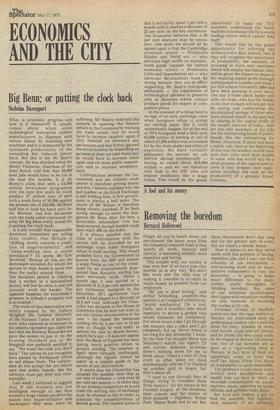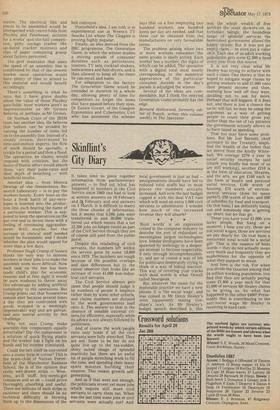A fool and his money
Removing the boredom
Bernard Holloviood
Forget all you've heard about job enrichment: the latest news from the industrial research front is that nearly all work, manual and clerical, is becoming steadily more repetitive and boring.
The trouble with our society is that very few of us have jobs that interest us in any way. We don't like work and the only way of making it tolerable is to exact as much money as possible from our employers ...
"My job is dead boring," said Arthur Schnelling, assembly-line operative at Croppard's Electricals, "purely mechanical. I'm a -tool, really, and it wouldn't take much ingenuity to devise a gadget that would eliminate me completely. For seven hours a day I go through the motions like a robot and I get competely fed up. Seven hours is too long for day-dreaming: I mean, by the time I've thought about last Saturday's match, last night's TV and current domestic problems there's nothing more for me to think about. There's a sort of click every so often when my mind automatically tells me I've chalked up another quid in wages, but that's about all.
-I used to run through lists of things, trying to complete them from memory. All the teams in the Football League, all the divisions, their colours and the names of their grounds — Highbury, Roker Park, Maine Road and so on. But
these distractions don't last long and for the greater part of every day my mind's a bloody blank."
Now it seems to me that we're stuck with this problem of boring, repetitive jobs and I can't see that schemes of job enrichment — restructuring work and its manipulative components to vary the monotony — is going to make much difference to the daily, weekly, yearly throughput of blinding boredom. But some of our industrial psychologists don't agree with me and are working on new methods of involving the worker in his job.
Professor Grimes of Sheffield points out that the cigar makers of Havana are entertained daily by professional readers who comb the press for tasty morsels of news, read novels aloud and tell stories, and he thinks the idea could easily be developed in Britain. Of course, very few of our factories are as quiet as a cigar-rolling shop in Havana: in fact most of them are appallingly noisy, so noisy that stuff like Music While You Work on loudspeaker is quite impossible.
The professor would equip every worker with headphones and enable him (or her) to listen to recorded commentaries on soccer matches, music, speeches by union officials and perhaps radio plays.
But he'd also employ a girl to feed the assembly line regularly with material of an arresting
nature. The electrical bits and pieces to be assembled would be interspersed with centre-folds from Playboy and Penthouse, pictures for a works' spot-the-ball competition. pithy sayings (rather like up-dated cracker mottoes) and slips of paper containing gossip about factory personnel.
The prof maintains that since the speed of an assembly line is conditioned by that of the slowest worker most operatives would have plenty of time to attend to this material and would benefit accordingly.
There's something in what he says, but I have grave doubts about the value of those Playboy gate-folds: most workers aren't as impressionable as Mr Grimes believes, or, perhaps, as Mr Grimes.
Dr Norman Crate of the IBSM team has another idea. He believes that tedium can be avoided by varying the number of items fed on to the assembly-line. Instead of a steady stream, determined by time-and-motion experts, the flow of work should be sporadic, a trickle for a period and then a flood. The operatives, he claims, would respond with criticism, but the bouts of frantic effort would absorb them, vary their pulse-rates and their depth of breathing — with beneficial results.
Another idea — from Monica Dewlap of the Neotechnics Research Laboratory — is to pay the workers hourly. Every hour on the hour a fresh batch of pay-envelopes is inserted into the production line, each bearing the name of a particular worker. This is supposed to keep the operatives on the qui vive and to invest them with a feeling of continuing aggrandisement. Well, maybe, but the increase in clerical staff needed would be formidable, and I doubt whether the plan would appeal for more than a few days.
Professor Hugh Cramp of Sussex thinks the only way to interest workers in their jobs is to make the assembly work more difficult. Now each task on the line has been made child's play for economic reasons and at first sight it would be pure madness to throw away this advantage by adding artificial complexity to the operations. But Cramp points out that housewives remain alert because several times a day they are confronted with goods wrapped in a seemingly impenetrable way and are galvanised into mental activity by this challenge.
Why not, says Cramp, make assembly-line components equally intractable? Dip the component in a solution of quick frying plastic and the worker has a fight on his hands and his interest stimulated.
Could the belt itself be converted into a comic strip in colour? This is the brain-child of Nathan Porterfield of the Manchester Business School. He is of the opinion that really well-drawn strips — Westerns, sci-fi stuff, boy-meets-girl romances and so on — could prove thoroughly absorbing and useful. There are millions of such strips in existence and there should be no technical difficulty in blowing them up to the dimensions of the belt conveyor.
Porterfield's idea, I am told, is in experimental use at Weem's TV Snacks Ltd where The Cloggies is proving highly popular.
Finally, an idea derived from the BBC programme, The Generation Game, in which the winner studies a moving parade of consumer durables such as percolators, toasters, TV sets, cocktail shakers, bedwarmers and hair-dryers, and is then allowed to keep all the items he can recall and name.
For adaptation to the factory The Generation Game would be extended in duration to a whole day, allowing plenty of time for competitors to forget the items that have passed before their eyes. Dr Eunice Gocart, of the Glasgow Ergonomics and Cybernetics Unit who has pioneered the scheme
says that on a line employing two hundred workers, one hundred items per day are needed, and that these can be obtained from the manufacturers on very favourable terms.
The problem arising when two or more workers remember the same goodie is easily solved. Each worker has a number, the digits of which can be added. The operative with a digital total most nearly corresponding to the numerical appearance of the particular consumer durable in the day's parade is adjudged the winner.
Several of the ideas are commendable, but I think the restyled Generation Game probably has the edge.
Bernard Hollowood, formerly editor of Punch, writes this column weekly in The Spectator



























 Previous page
Previous page